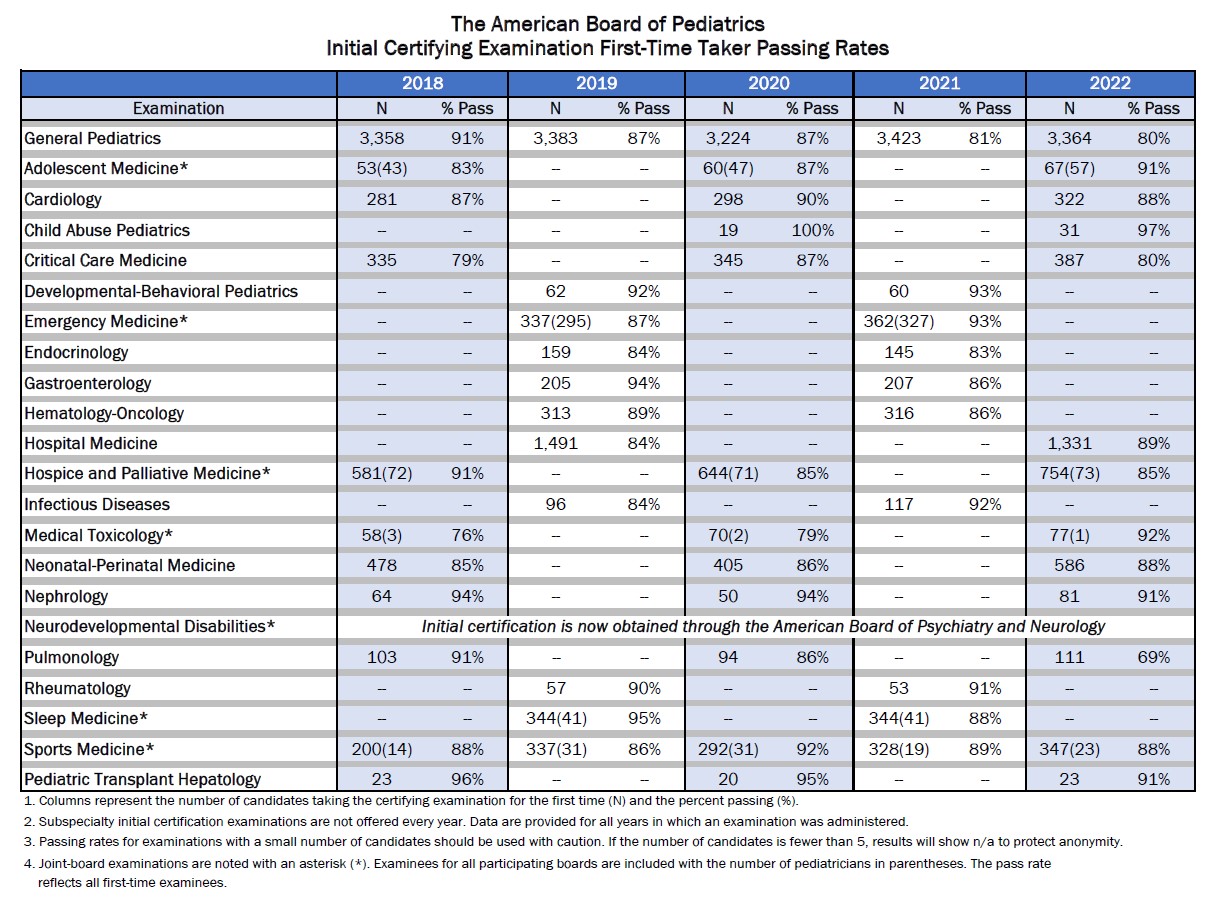The American Board of Pediatrics (ABP) board exam is a pivotal milestone for pediatric medicine physicians. It is instrumental in validating the skills, knowledge, and expertise of professionals in pediatrics. Here, we will explore the intricacies of the ABP exam, offering insights, tips, and strategies to optimize your preparation and performance.
ABP Exam Dates
| General Pediatrics Regular Registration |
January 16 - April 1, 2025 |
| General Pediatrics Late Registration |
April 2 - May 20, 2025 |
| 2025 General Pediatrics Exam Dates |
October 14-16, 2025 |
Exam Features
The ABP certification exam is composed of approximately 350 single-best-answer, standard multiple-choice questions that follow the ABP Blueprint. Each question is in paragraph form with an answer set containing one correct answer and three or four incorrect answers.
The exam is divided into four sessions each lasting one hour and 45 minutes, separated by scheduled breaks. The entire exam appointment takes approximately nine hours to complete.
Content Specifications
Exam content is determined by a pre-established blueprint, or table of specifications. The blueprint is developed by ABP and is reviewed annually and updated as needed. Trainees, training program directors, and certified practitioners in the discipline are surveyed periodically to provide feedback and inform the blueprinting process.
The primary medical content categories of the blueprint are shown below, with the percentage assigned to each for a typical exam:


Strategizing Your Preparation
Comprehensive Study Material
Choose study resources that are aligned with the ABP Blueprint, ensuring that you cover every topic in depth. Resources like Med-Challenger Pediatrics offer tailored preparation with a vast question bank of constantly updated content.
Mock Exams and Simulations
Simulated exams, such as Med-Challenger's Board Exam Simulator, part of the Pediatric Boards Prep Course, are instrumental in gauging your preparation level. They offer insights into your strong areas and those requiring improvement, enabling a focused preparation strategy.
Time Management
The ABP exam evaluates candidates under timed conditions. Practice with timed mock exams to enhance your time management skills, ensuring that you can navigate through the questions effectively and efficiently during the actual exam.
See also: How To Prepare for Pediatric Boards - 8 Tips to Pass ABP Exam
Navigating the Exam Day
Stay Calm
It’s natural to feel anxious. However, staying calm and composed is crucial to think clearly and make informed decisions during the exam. Knowing what to expect by checking out Exam Day: What to Expect can also help put your mind at ease.
Pace Yourself
The exam is structured to evaluate a broad spectrum of your skills and knowledge. Pacing yourself is crucial to ensure that every section of the exam is attempted with equal focus and concentration.
Review Your Work
If time permits, review your answers. Sometimes, a second look can offer new perspectives and insights.
See also: What Pediatricians Say About Med-Challenger - Pediatrics CME Reviews
Post Exam Day
Notification of Examination Results
Exam score reports are typically posted in your online portfolio within 60 days of the exam administration date. Although the examination is administered on the computer, we cannot provide you with your results at the testing center. We conduct extensive quality control activities before releasing results to ensure that the examination is psychometrically sound and the data are accurate.
In addition, without exception, each candidate's examination score is reported to his or her program director. The names of certified pediatricians, but not their scores, are sent to appropriate organizations and directories.
Passing Criterion and Scoring
There are multiple versions of each certifying examination, and a rigorous scoring procedure ensures that all candidates are held to the same passing standard regardless of which version of the exam they receive.
After administration, statistical analyses are conducted and a small number of questions may be deleted if they do not meet standards for statistical and psychometric validity. Deleted questions are not included when calculating candidates' final scores.
After deleted questions are removed, a candidate's total score is calculated as their number of correct answers. No points are deducted for incorrect answers and all questions are weighted equally.
Although the total score is based on the number of correct answers, all examination results are reported using a 1 to 300 scale, with 180 designated as the passing mark. This conversion is necessary because there are multiple versions of each exam. The versions may vary slightly in difficulty because they contain different questions, and it would be unfair to require someone who had a more difficult version of the exam to answer the same number of questions correctly as someone who had an easier version of the exam. A statistical process known as equating is applied to ensure that everyone is held to the same passing standard. Therefore, a candidate's score on the 1 to 300 scale does not reflect the percentage of questions answered correctly. Instead, a 180 represents the minimum level of knowledge required to pass the examination.
Pass Rates
